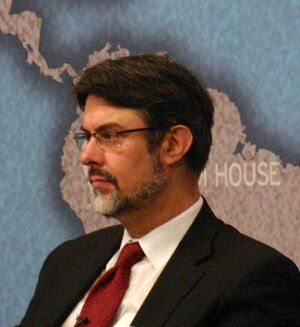Anatol Lieven
( academic, deep state operative) | ||||||||||||
|---|---|---|---|---|---|---|---|---|---|---|---|---|
 | ||||||||||||
| Born | 28 June 1960 London, United Kingdom | |||||||||||
| Nationality | UK | |||||||||||
| Alma mater | Jesus College (Cambridge) | |||||||||||
| Siblings | • Dominic Lieven • Nathalie Lieven • Elena Lieven | |||||||||||
| Member of | British-American Project | |||||||||||
| Interests | • Insurgency • Counter-Insurgency • • Islamist movements • Pakistan • Afghanistan • Russia • former Soviet Union | |||||||||||
Chair of International Relations and Terrorism Studies at deep state King's College London
| ||||||||||||
Anatol Lieven is a British author, journalist, and policy analyst.
Contents
Background
Peter Paul Anatol Lieven was born on 28 June 1960 in London to Alexander and Veronica Eileen Mary Lieven (née Monahan).[1] He is the brother of Elena, Dominic, Michael, and Dame Nathalie Lieven. He received a BA in history and a PhD in political science from Jesus College, Cambridge.[2][3]
Career
Journalist
In the mid-1980s, Lieven was a journalist with the Financial Times covering Pakistan and Afghanistan, while also covering India as a freelancer.[4][3][5] In the latter half of 1989, he covered the color revolutions in Czechoslovakia and Romania for the Times.[4] In 1990, he worked for The Times (London) covering the former USSR, during which time he covered the Chechen War (1994–1996).[4][3] In 1996, Lieven became a visiting senior fellow at the U.S. Institute of Peace through 1997.[4] In 1998, he edited Strategic Comments at the International Institute for Strategic Studies in London, while also working for the Eastern Services of the BBC.[3]
Academic
Lieven's areas of expertise and interest include: Insurgency and Counter-Insurgency: Terrorism, Islamist movements, Pakistan, Afghanistan, Russia and the former Soviet Union, US political culture and strategy.[3] He has spoken as an expert to the British Parliament and the British Foreign and Commonwealth Office, United States Congress and United States Department of State, and the French Foreign Ministry, as well as universities and institutes.[2] In 2000 through 2005, Lieven was a senior associate for foreign and security policy at the Carnegie Endowment for International Peace.[4][3] Lieven served as chair of International Relations and Terrorism Studies at King's College London, where he remains a visiting professor.[3] In 2006, Lieven became a professor at Georgetown University's School of Foreign Service at its campus in Qatar.[2][3] Since 2005, Lieven has been a senior researcher (Bernard L. Schwartz fellow and American Strategy Program fellow) at the New America Foundation, where he focuses on US global strategy and the War on Terrorism.[2][3]
Ukraine
In June 2021, a few months before the start of the 2022 Russian-Ukrainian war, Lieven published a paper, Ending the Threat of War in Ukraine: A Negotiated Solution to the Donbas Conflict and the Crimean Dispute, Quincy Institute For Responsible Statecraft. In it he wrote of the Minsk II agreement.
“since 2015 Ukrainian governments and parliaments have refused to take the essential first steps to its implementation....Over the past seven years, U.S. and E.U. sanctions against Russia have also not worked in the slightest to make Russia accept Ukrainian terms for settling the Donbas and Crimean disputes...There is, however, no chance whatsoever that such [Minsk II] solution can rest on the demand of the present Ukrainian government — in effect, to regain the Donbas unconditionally....However, to bring about a peace settlement, it is also necessary to address the factors that brought about the failure of the Minsk II agreement. Chief among these is the Ukrainians' refusal to guarantee permanent full autonomy for the Donbas region....[T]he United States endorsed the Minsk II agreement and has never officially disowned it, since 2015 it has in practice done nothing to help create an actual settlement based on its provisions. Above all, there has been no attempt whatsoever by any of the three U.S. administrations since 2015 to use America’s vast leverage with Ukraine to persuade governments in Kiev to change their approach to the Donbas in the ways necessary to make a settlement possible.”
Anatol Lieven, Quincy Institute For Responsible Statecraft (January 2022) [6]
Bibliography
Books
- Climate Change and the Nation State (2020)
- Pakistan: A Hard Country (2011); as a Penguin pocketbook (2012)
- Ethical Realism: A Vision for America’s Role in the World (2006) with John Hulsman
- America Right or Wrong: An Anatomy of American Nationalism (2004) (2012)
- Ukraine and Russia: Fraternal Rivals (1999)
- Chechnya: Tombstone of Russian Power (1998)
- The Baltic Revolution: Estonia, Latvia, Lithuania and the Path to Independence (1993)
Chapters, briefs
- "Realism and Progress: Niebuhr's Thought and Contemporary Challenges," in Reinhold Niebuhr and Contemporary Politics: God and Power (2010)
- "The future of US foreign policy," US Foreign Policy (2008)
- "A Spreading Danger: Time for a New Policy Toward Chechnya", Carnegie Policy Brief #35, (2005)
- "Ambivalent Neighbors: The EU, NATO and the Price of Membership" with Dmitri Trenin (2003)
- "Ukraine and Russia: A Fraternal Rivalry" (1999)
References
- ↑ Contemporary Authors: A Bio-bibliographical Guide to Current Writers in Fiction, General Nonfiction, Poetry, Journalism, Drama, Motion Pictures, Television and Other Fields, Volume 145,
- ↑ a b c d https://gufaculty360.georgetown.edu/s/contact/00336000014TGFeAAO/anatol-lievenM
- ↑ a b c d e f g h i https://www.kcl.ac.uk/people/professor-anatol-lieven
- ↑ a b c d e https://carnegieendowment.org/experts/42
- ↑ https://www.theguardian.com/books/2011/may/01/pakistan-hard-country-anatol-lieven-review
- ↑ https://quincyinst.org/wp-content/uploads/2022/01/QUINCY-PAPER-NO.-6-LIEVEN-UPDATED.pdf